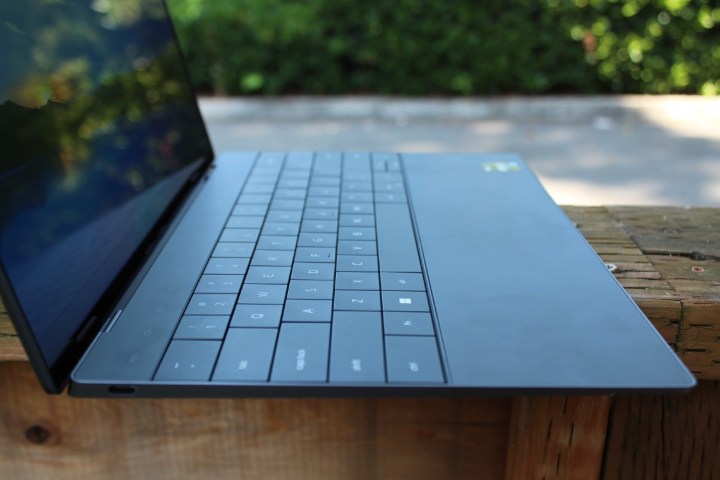It’s been years since we’ve had to debate the merits of analog headphones jacks. But like it or not, we’ve all moved on from there in our smartphones, accepting the fact that wireless earbuds, USB-C (or Lightning) headphones, and the occasional dongle will suffice. Even the iPad Pro moved on from the beloved headphone jack.
But in 2022, the issue has returned — and this time, it’s for laptops.
The Dell XPS 13 Plus is the company’s new flagship laptop, a device bursting at the seams with new ideas and fresh innovation. Among these features are an invisible haptic touchpad, an edge-to-edge keyboard, and even a row of capacitive touch buttons to replace the function keys.
The extremely compact and refined design, though, didn’t leave room for a conventional audio jack. It’s not that the device is too thin to house a headphone jack — after all, even the ultra-thin M2 MacBook Air includes one.
Instead, it’s about how the designers at Dell choose to use the space available to them. The keyboard on the XPS 13 Plus runs right up to the edge of the chassis sides, giving the device an extremely efficient-looking design. No space is wasted, allowing for the extra-large keycaps to extend right to the edge of the laptop. It’s a spectacular look.
Dell has shown how certain designs had been off the table due to the need for a headphone jack.
But it also means that the only location available to include ports are in the small area between the keyboard and the hinge. Without wanting to ditch one of the two USB-C ports, that left the headphone jack on the cutting room floor. In other words, it’s the removal of the headphone jack that allows for this kind type of design innovation.
That’s a lot more justification than was given when the iPhone first ditched its headphone jack. We were told it would allow for thinner devices, bigger batteries, and more features — but we were never given proof. With the XPS 13 Plus, Dell has shown how certain designs had been off the table due to the need for a headphone jack.
That’s bound to not be true for every laptop that decides to cut out this port in the future. Some manufacturers will undoubtedly jump on the bandwagon just to appear edgy or fashionable. But who knows what other innovation some extra space within the chassis could allow for? Every millimeter counts, and one less port can sometimes make all the difference.

And because smartphones led the way in the accelerated adoption of wireless audio, we’re much more prepared to leave the headphone jack behind. Wireless earbuds are cheap and widely available, even as connectivity standards like Bluetooth 5.2 continue to improve.
Personally, I found myself using the headphone jack on laptops less and less — and I bet you do too. Don’t believe me? Just go ahead and count how many times you actually need to use it over the next week. I bet it’s less than you realize.
In my time with the XPS 13 Plus, I only encountered one situation when I actually wished I had a headphone jack. My wireless earbuds had died, and I wanted to listen to some music while I worked. Lo and behold, there was nowhere to plug in my backup pair of wired headphones. Thing is, the adapter Dell included in the box fixed this problem within a few seconds. Before I knew it, I was back to work. It’s a bit of a clumsy solution, but hey, it showed me how small my perceived “need” for a headphone jack really was.
I’m not saying every laptop in the future needs to ditch headphone jacks.
Now, I know what you’re saying. You love your set of old wired computer speakers that you use at your desk. Or maybe you enjoy the ease of jacking into your living room entertainment system. Or maybe you just hate Bluetooth.
I’m not saying every laptop in the future needs to ditch headphone jacks. The huge variety of designs in the world of PCs and laptops is its great strength, and it means there will always be room for devices that carry older ports. Heck, even Apple reversed course on its MacBook Pros to bring back ports like HDMI and an SD card slot. There are certain use cases with laptops that certainly make sense for a headphone jack to be included.
But don’t poo-poo the innovation. I agree that removing features for the sake of removing them doesn’t help anyone. But Dell has already proved that there are advantages to taking the plunge — and I, for one, am ready to embrace what a headphone jack-less future has in store.
Editors’ Recommendations

